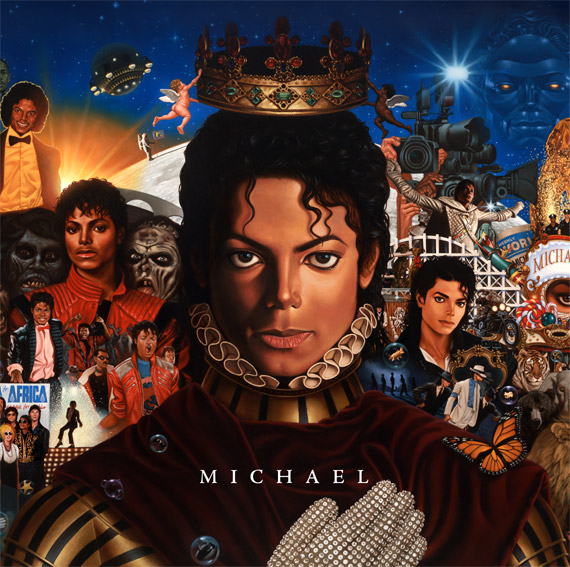Given that Michael Jackson spent the last 15 years of his life in more or less total seclusion, it’s sort of fitting his first posthumous studio release is surrounded with questions as to whether or not it’s even Jackson singing on some of the tracks. Part of me thinks that Sony planted those rumors as a form of damage control if the album was panned or failed to sell, but this kind of controversy really just comes with the territory for anything related to the King of Pop at this point. Given that his estate inked a massive deal with Sony earlier this year, it goes without saying that Michael will be the first in a long line of releases featuring unreleased Jackson material. Don’t be surprised in the slightest if he becomes this generation’s Elvis Presley or Tupac Shakur. But for as dreary as this slew of releases will inevitably become, Jackson’s estate is off to a surprisingly solid start.
The first thing that jumps out about Michael is its relative brevity: its ten tracks clock in at just over 40 minutes, making it his shortest album since 1987’s Bad, the last album he made as the kind of superstar he was before his troubled personal life became the focus of public attention. As Jackson became more of a tabloid fixture during the ‘90s and ‘00s, his studio albums grew longer, more overstuffed, and less consistent, often dragged down by screeds against the paparazzi. There’s only one such track on Michael (“Breaking News”), and it’s the album’s low point, but for the most part, the producers keep the focus on Jackson as a musician rather than a celebrity, which—given the world-class talent he was—is always a good decision. Since Jackson’s death, as often happens with this sort of thing, there has been something of a public rediscovery of body of work, and the general consensus on his legacy now is less reclusive train-wreck and more Sinatra/Elvis/Dylan-level creative icon. As such, the less-is-more approach taken by the producers of Michael is probably to Jackson’s benefit.
Jackson was known in his lifetime to mine years-old tracks from his vault, so it comes as little surprise that the songs on Michael evoke different periods of his career. The album is split evenly between lush ballads that resemble his ‘80s smashes and abrasive, hip-hop-informed tracks that would have fit right in on Dangerous or HIStory. The songs in the former mold are better, but even the more recent tracks are surprisingly finished-sounding. The relative lack of celebrity guests on Michael is refreshing, and the three that are included come off well. The album’s first and best track, “Hold My Hand,” is a duet with Akon. The 2006 R&B hook-man of choice has musical compatibility with Jackson that is well-documented—his remake of “Wanna Be Startin’ Somethin’” was the only bonus track on the 2008 reissue of Thriller that wasn’t a complete waste of space—and here, his reedy tenor blends nicely with Jackson’s still-soaring voice. 50 Cent’s verse in the “Thriller”-aping “Monster” is kind of pointless, but not embarrassing, about as good as you could expect from a 50 Cent-Michael Jackson collaboration. Lenny Kravitz does his best to carry the Slash/Eddie Van Halen torch on the token rocker-with-a-celebrity-guest-guitarist “(I Can’t Make It) Another Day,” and acquits himself just fine. Crucially, all three of these collaborations were recorded during Jackson’s lifetime, a refreshing contrast to any of the dozens of posthumous albums released under Tupac’s name featuring guest verses from rappers who were in diapers when he was murdered.
As for the questions about whether this is Jackson’s voice on these recordings, well, it damn sure sounds like him, so I’ll give Sony the benefit of the doubt. And he sounds great, especially on the ballads. At its best, his vocal acrobatics on songs like “Keep Your Head Up” and the gorgeously understated closer “Much Too Soon” can still induce “Human Nature”/”Earth Song”-level chills. The heavier tracks are more of a mixed bag, but “(I Can’t Make It) Another Day” and the outstanding “Behind the Mask” have real teeth.
The parade of new Jackson albums will in all likelihood only go downhill from here, but for now, the King of Pop’s estate has released an album that in no way tarnishes his musical legacy. Who knows whether the notoriously megalomaniacal Jackson would approve of this album—people on both sides of that argument have valid points—but as a start-to-finish collection of songs it’s more enjoyable and less filler-stuffed than anything he’s released since Bad, a minor miracle given the circumstances.

